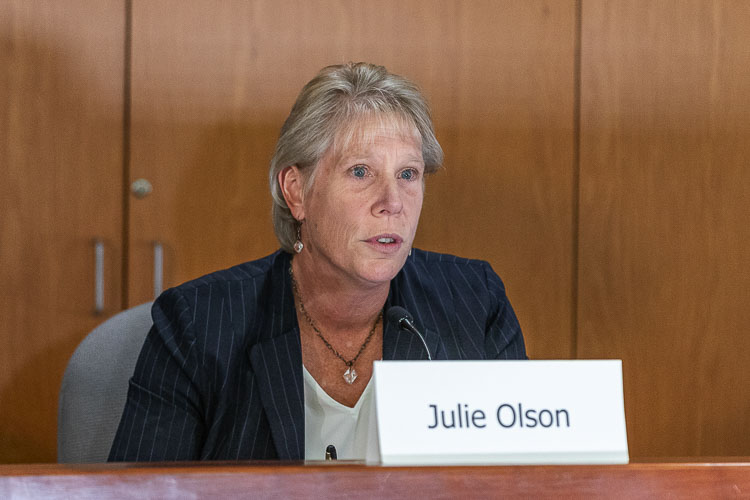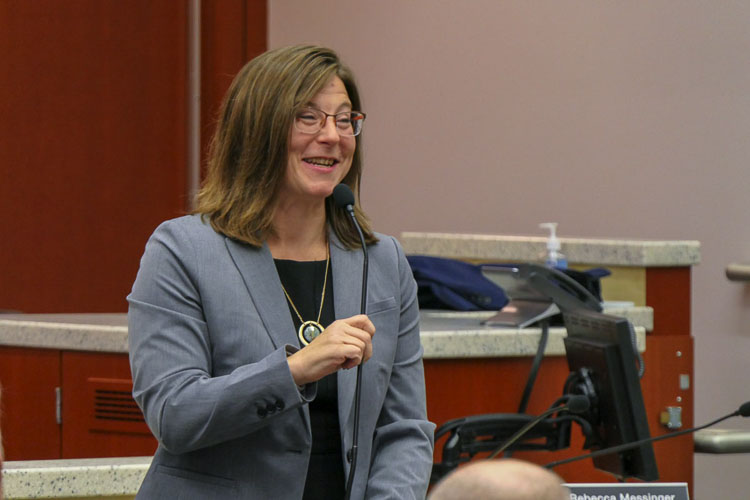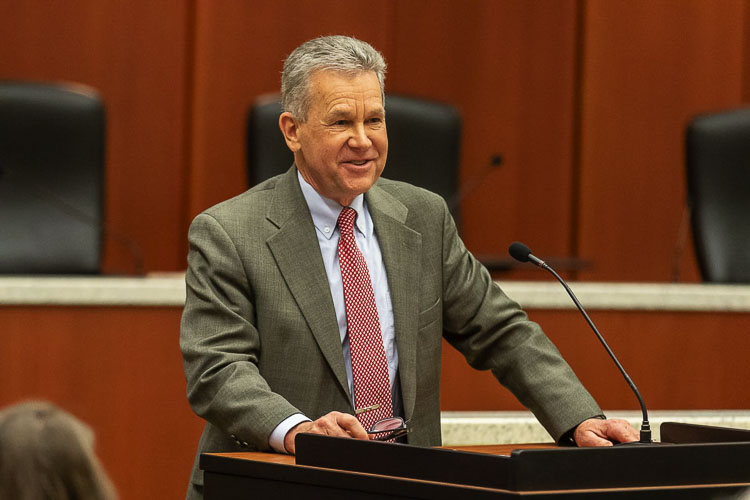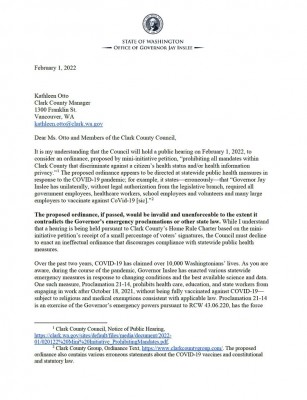Councilors voted 4-1 at the end of a four-hour meeting Tuesday night to reject the petition
In the wake of a threatening letter from the office of Gov. Jay Inslee and substantial caution from their own legal counsel, members of the Clark County Council voted Tuesday night to reject a mini initiative petition to stop some mandates in Clark County.
Voting on a motion to reject the petition, the councilors voted 4-1 in favor of rejecting the petition. Councilors Temple Lentz, Julie Olson, Karen Bowerman and Gary Medvigy voted in favor of the motion to reject the petition. Chair Eileen Quiring O’Brien voted against the motion.
The petition was the result of the efforts of dozens of volunteers and support of 11,505 Clark County citizens over the past few months. That effort culminated Tuesday evening when members of the County Council held a public hearing in a virtual format to address the mini initiative petition. Councilors heard two hours of testimony from Clark County citizens, including those who spoke in favor of and against the petition.
Area resident Rob Anderson began the effort last fall. He and many other citizens believed the forced vaccination mandates, as well as other mandates that aren’t equally applied, ultimately discriminate and should be challenged. Anderson addressed the members of the County Council at the beginning of the public comments during Tuesday’s meeting. The summary statement on the petition reads as follows:
AN ORDINANCE prohibiting all mandates within Clark County that discriminate against citizens regarding their health status and or that violates existing rights to health information privacy.
On Nov. 30, Anderson and Vancouver attorney Angus Lee presented 11,505 signed petitions to Cathie Garber, Clark County Elections supervisor. The proponents needed 8,311 signatures for the mini initiative to be valid. After a 30-day window to validate the signatures, the County Council then had 60 days to hold a public meeting, after which the councilors had a 30-day time limit to make a decision.
On Tuesday, prior to the public meeting, members of the council received a letter from Kathryn Leathers, general counsel for the Office of Governor Jay Inslee.
“The proposed ordinance, if passed, would be invalid and unenforceable to the extent it contradicts the Governor’s emergency proclamations or other state law,’’ Leathers wrote. “While I understand that a hearing is being held pursuant to Clark County’s Home Rule Charter based on the mini initiative petition’s receipt of a small percentage of voters’ signatures, the Council must decline to enact an ineffectual ordinance that discourages compliance with statewide public health measures.’’
After citing Gov. Inslee’s actions of “various statewide emergency measures’’ during the past two years, Leathers offered this final conclusion to the Clark County councilors.
“During this pandemic, the health of the public is paramount,’’ Leathers wrote. “Governor Inslee has consistently and vigorously opposed efforts to undermine emergency public health measures and will continue to do so. The Council must decline to pass any ordinance that contradicts state law or undermines public health.’’
The letter from the governor’s office came after a 13-page memorandum
dated Jan. 29 (Saturday) was provided to the councilors by Chief Civil Deputy Leslie Lopez. The memorandum was not available to the public until councilors waived their privilege during Tuesday’s meeting.
The councilors then received verbal explanations during the meeting of many of the questions Lopez answered in the memorandum about the passage of the mini initiative petition. For example:
Does the Clark County Council have the authority to enact the proposed ordinance?
“The Council has the authority to enact proposed ordinances as permitted by state constitution and to the extent the proposed ordinance does not violate state or federal law,’’ Lopez stated in the memorandum. “The Washington State Constitution, Article XI, Section 11 provides broad authority to counties to act in the event of an emergency, stating: Any county, city, town or township may make and enforce within its limits all such local police, sanitary and other regulations as are not in conflict with general laws. This authority, however, is limited by state law. Local governments cannot have ordinances that conflict with state law.’’
Later in the response to the same question, Lopez wrote: “Local governments have no authority to override the state’s requirements for vaccinations for certain employees or for indoor mask requirements. While there is language in the various state proclamations and orders that allows local officials to implement more stringent requirements than the state, there is no language or statutory authority allowing local officials to circumvent the state requirements or introduce less stringent requirements. Likewise, the Council’s authority is limited by federal law if a proposed local ordinance conflicts with federal law. Therefore, the Council does not have the authority to enact any ordinances that would be less restrictive than the current state and federal mask and vaccine mandates.’’
The memorandum also address the following question:
What are the consequences, if any, in enacting the proposed ordinance?
‘’To the extent the Council enacted the proposed ordinance to ban existing state and/or local mask and vaccination mandates, the County, Board of Health, businesses/employers, and school districts could suffer consequences,’’ Lopez stated in the memorandum.
The potential consequences listed in the memorandum included:
• The County could lose state or federal funding/grants.
• The local health officer and/or a member of the local health board could suffer penalties.
• Employer consequences.
• Schools may lose funding from the Office of Superintendent of Public Instruction (OSPI).
Council discussion
After listening to five minutes of testimony from Anderson and the two hours of testimony from citizens, it was time for the councilors to discuss their thoughts on the mini initiative petition. Although the councilors had 30 days to vote on the petition, it was clear they were ready to cast their votes during Tuesday’s meeting.
Councilor Olson was the first to speak, after she previously had made the motion to reject the petition.

“There’s no doubt that this pandemic has had an extraordinary impact on everyone,’’ Olson said. “Whether there are health care workers, whether there are seniors, our kids in school or athletes, our families, everyone. We’ve lost 10,000 people here in the state of Washington alone, from COVID.
“Local governments cannot have ordinances that conflict with state law,’’ Olson stated. “Clark County is an arm of the state government. So we have the obligation to not pass ordinances that are in conflict with state law. And we heard a lot tonight about the oath of office that we took when we were sworn into office. And the oath is to support the Constitution and the laws of the United States and the laws of the state of Washington and to faithfully and impartially discharge the duties of this office. And I think that’s what I’m doing tonight. I think that’s what all of us are doing tonight. And so given that we have, I think, clear guidance that we don’t have the authority to pass an ordinance or law that conflicts with state law, was the reason that I made the motion.’’
Councilor Bowerman offered the most in-depth and personal explanation for her vote, including the following comments.

“We think, and we vote, in part as an outgrowth of our life experiences,’’ Bowerman said. “So here’s who I am relative to the mini initiative because it’s relevant in explaining my vote tonight, and I feel the responsibility to our residents to explain my vote tonight. I have the same concerns that many of us do about (the) County Council not having authority to enact any ordinance that is less restrictive than the current state and federal mask and vaccination mandates. However, my experience relative to COVID differs from many, because I volunteer in a multi-year national research study on the efficacy of vaccinations. Countless emails and calls challenge a decision on ‘liberty or tyranny,’ but that is not what the ordinance says. This ordinance calls for no violation of health information privacy. The U.S. has had that guarantee for years. We need no county ordinances for medical privacy.
“It also says that the county must prohibit mandates that discriminate against citizens regarding their health status. Think more deeply about what that might mean,’’ added Bowerman. Later, she stated, “If health care facilities or religious organizations, for example, were deprived by the county of being able to require employees to mask, the government is discriminating against immunocompromised. I cannot vote for that kind of discrimination. The immunocompromised are advised that close contacts be fully vaccinated; it’s necessary that facilities wanting to provide a safe environment be allowed by county government to do so and be free to tell customers that’s their policy.’’
Councilor Lentz had provided extensive details recently of the reasons for her opposition to the petition on social media. On Tuesday, she was succinct.

“We’ve been operating under pandemic restrictions for two years now,’’ Lentz said. “And understandably, we’re all growing tired of the measures that we put into place to protect public health. But this mini initiative won’t move us forward. The ordinance would put the county and every business organization and agency within it into conflict with state and federal law. The county does not have the authority to violate state and federal law, nor does it have the authority to force those within the county’s boundaries to do so.
“Our job as counselors is to make decisions that benefit the whole rights are not absolute,’’ Lentz added. “One individual’s rights do not include the right to bring harm into the public square. … This ordinance would do substantial harm to Clark County and its residents, so I can’t support it.’’
Councilor Medvigy offered:

“I spent my life in law. And to me, I’m proud of my country, I love my constitution. I’ve sworn an oath to it over and over and over again,’’ Medvigy said. “And we are a country based on laws. We can’t do what this mini initiative wants us to do. It would be a violation of law, plain and simple.
“I’ve always done what I was told to do. I’m a rule follower,’’ Medvigy said. “And if the government told me to take nine anthrax shots, I said, ‘yes sir. Give them to me.’ Because I know it’s for good as far as protection. Now, you know, being in the military is a little different. But all this rhetoric about liberty and freedom, and some of these comments tonight, were pretty threatening, I thought, and really poorly stated.’’
Quiring O’Brien told Clark County Today Wednesday that she just could not bring herself to vote against the petition, even though she acknowledged the mountain of information provided by the county’s legal counsel and the governor’s office.
“I feel so strongly about the overreach of the governor I could not vote in favor of it and vote against dropping it,’’ Quiring O’Brien said Wednesday.
During Tuesday’s meeting, Quiring O’Brien offered an explanation of her vote.

“Sometimes there are laws that are just wrong and bad,’’ she said. “And we need to act against those laws. I think the laws that the governor, the mandates that the governor has placed upon this state, are bad mandates. After all, he closed churches and kept pot shops and liquor stores open. That sound doesn’t sound right to me.
“Next, we are a form of government that represents the people,’’ she added. “This initiative, or the possibility for this initiative to come before us, is a way for the people of this county, individuals, to come to us and address us to ask us to to change what is going on in this county with discrimination with regard to masks and vaccines. This is their only way to do it. And I think that we need to honor that. We need to listen to that.
“The idea that in the United States of America, we don’t have bodily autonomy to be able to turn something down, to be able to turn the shot down or lose our livelihood, it is wrong, wrong wrong,’’ she said.














